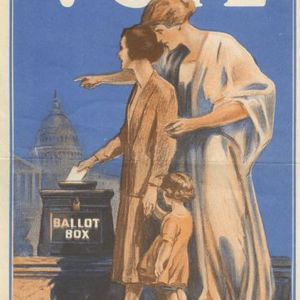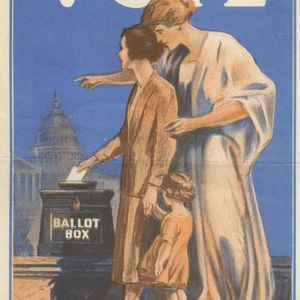I was bound for America before I even knew I was going. But on that March 1899 morning in Michigan, I was only working to get to the head of the shop’s line. I had priests to feed.
My family’s line stretched back to Germany where I was born Anna Freiheiter. I believed my family name to be my mission. It would be freedom, at liberty to think and speak like anyone. To reason and settle a fight, to argue for what is right, those were the things I desired. Oma Helena kept her land after she lost Opa Heinrik, at first. I could keep my place in line in August Bircher’s meat shop in Raisinville and keep quiet. But my womanhood would be heard, though, not carted off like my Oma’s when she faced down the province’s tax collector. They would not jail her. She was imprisoned, bundled into an asylum. Her crime was becoming too old to know if her land was being stolen.
That was more than just the old world, that was the old century. Not our new Twentieth, less than a year away. By the new year it would be dark in the late afternoons. On the butcher’s ceiling overhead ran wires for the lights he was about to install. Electricity. Telephones. Magic, it felt like, so why not believe the word mankind meant women as well as men? In Michigan I might own land, start a school, or speak for people poorer than me. Bold dreams maybe, for a girl of 22, one still unmarried. Marriage was further out of reach each day. Men had desired my company for the wrong reasons, my waistline and auburn hair, my shape that I might have hidden under a bustle. The shape took innocence from me in Pittsburgh and then my honor in Cleveland.
On that March day I simply wanted a Sunday supper’s meat. Raisinville had its own depot on Mill Street, but the town was so small that we all had a 20-minute wait at the butcher’s on a Saturday. No big-city rake could worm his way into my country retreat. I had the housekeeping for St. Joseph’s, a live-in position I arranged with my reference from Cleveland. Men of chastity would be the best employers. No matter what any priest taught, I could not believe God meant to withhold the joys of freedom to think from half the world’s souls.
Some thinking was expected, the thinking to manage the household of two priests in the rectory at the end of Frederick Street. Cook, sew, wash. Words that ruled my life and my morning’s wait. It might be stew and pork and lamb chops through the week, plus the cod I made on Fridays. But Sunday’s suppers were a celebration that summoned extra talent to prepare. A good roasting hen — no, two, now there was a new and younger priest to be living in the rectory. The new one would tell me soon enough what he desired on his table.
The line moved slowly, everyone sizing up the cut meats Augie displayed in his case. All were on ice, but many of the women wanted a cut from the side of beef hanging just off the shop’s counter in the room behind. The chickens required no cutting, but selecting them took a sharp eye. A thick breast, ample thighs and drumsticks. Something that would cook in less than the two hours after the Masses. I didn’t know about the new priest’s needs, but Father Frank liked his supper before 3, so he could retire to the parlor to read his novels.
While the women shuffled and gossiped, the mutter of their voices took me into my practice of observing them. I scanned their hats, among the ladies who wore them, and noticed the tight braided buns of the domestics like me. Few wore the Gibson buns like mine. They would say my hairstyle looked like I was putting on airs. But I always disturbed people who expected me to be blend in. The forests in the Alsace at home were as green as the ones in Michigan. A mill was at the center of both towns, but in the Alsace it was a sawmill. They cut things down in Germany. Here I saw a town growing up all around me.
The meat-cutting in the shop brought out the tang of blood and the aroma of feathers were plucked off the birds. I took a deep whiff like I often did, not afraid to recoil at the scent of butchered food. I grew up in a place where I killed barnyard fowl, swinging a hatchet instead of a bundle of books. Before that, I was told I could wring the chickens’ necks. I always tried to avoid my favorite hens. I knew a good chicken for the pot.
The line finally brought me face to face with August. He sized me up like a cut of ribs, eyes running over my corseted midriff and dancing over my bosom. Some of the ladies tittered at his attention.
“He is a man who is safer behind a counter,” said Dorothy. A woman with a sharp eye for men who chose me as an ally, she and I talked of the stories in Godey’s Journal while we mingled and lined up in these Raisinville shops together.
“Indeed, a man with meats on his mind,” I said. We giggled at our wisdom.
“Good morning, Anna” he said. “How lovely this morning is.” The clouds were broken outside, so he was not making up a story. Not entirely. But his expression made me push back a shiver.
“Good day to you, August.”
“Please, you know, it’s Augie. What can I offer you today?” He rocked up on the balls of his feet, like he was holding himself up for approval.
“I think just your best hens today.”
“Not the rib roasts? Cut just this morning. Even after sunup.”
“No, I have a new recipe I want to try. Godey’s, you know.”
“You’re a reader of English, are you? Full of spark. I thought you’d be one of those new Good Housekeeping ladies. Let me get some hens from the back. The special ones I’ve been setting aside.”
He darted back to the table behind his curtain. I turned to look at the ladies watching him and studying me. I faced the counter.
“Anna, you must show me how to do my hair that way,” said my ally.
“Indeed, I can, Dorothy. You have such fine hair. I wish my color was like your gold.”
She smiled at me in her secret way, the one that showed she knew she was pretty. It was the root of our alliance. She was not a morsel for just any man to devour, she would say on our walks back. But she set out her course to choose the best man Raisinville could offer. Her opinion on who that was varied like the March weather. On the day at Augie’s counter, we talked about the meals to be cooked tomorrow, the weather, even the crops. Her latest heart’s desire was a man with 57 acres.
“Dorothy, did your man decide to put in that wheat in the north-most acres?”
“He has, and even read me the passage in the Farmer’s Almanac about the chances for good rain.”
“Like we ever need to think about that here. Look at this mud on my shoes.”
Augie reappeared with three hens. He wore a smile I’d seen before. “Oh no, sir, I think just two. They’re beautiful, though.”
“Just the word I was thinking of myself,” he said. He was not looking at the birds. He leaned forward. “I just wanted to give you a choice, but you may have the third one at no cost.”
“I couldn’t do that. It would not be fair to the others.”
He lowered his voice. “I do think of being fair, but you deserve more. After all, you are serving priests. Let me offer it to you.” I must have frowned, because he added. “I am only offering it to you, as the cook for the fathers.”
“Augie, you’re a Lutheran.”
“I think about that on Sundays, but even more on Saturdays, when I see all the Catholics lined up.” He rose up on the balls of his feet to look at my hemline. “Like you.”
This was going no place I wanted a shopkeeper’s talk to lead toward. “I will take three hens then,” I said, raising my voice. “We do have another priest to feed, the new one.”
“Yes, we’ve seen him this morning, walking with his satchel and looking lost. I might have been mistaken, but I’m told he asked the way to the rectory.”
While he wrapped the hens, glancing slowly at me and then at the paper, I set his looks aside. I grew up in the corral of a farm community and longed for a gate to lead me beyond the life of a wife and daughter. In Alsace I’d be saddled for a ride down the bridle path to bridehood. A prosperous man would court me. My Opa said I should pray that the man, whoever he would be, was not already wearing too much gray on his temples. She ran her farm, did the accounts, arranged breeding and buying of stock and seed. Most of all, I saw her grow the alliances with other women to follow her lead in matters of money, love, and which promises should be broken and which kept. When the province broke its promises, I left for a better life.
Outside the shop in the street I heard horse teams’ hooves pound on the cobbles. Opa warned me of years as a man’s brood mare, and if I was lucky, loving the child-colts I’d deliver into a world. Months of those infants at my teats, until the body whose curves I loved to watch in my mirror fell into my mother’s thick shape.
“There’s the birds for you, Anna. Your new priest will approve. Of the cook, too.” He gave me a wink.
“He’s also a priest, Augie. Of finer manners than yours.”
He only smiled at my reply. “Got to say, I’m glad he’s just a man of God. Leaves the field of females open to us bachelors.” He took my silver dollar.
“Augie, I thank you for your choice of those fine birds. Father Frank will be impressed. Your trouble,” I added, as I put the hens in my bag, “is that you are too generous on Saturdays. We all need the best here. You might charge every one of us the going price.”
“There are always sharp choices for my best customers. Come see me on Monday. I’ll have quail by then, and not small ones.”
I left the shop and did not turn to see his smile, the one he tracked me with whenever I walked away. Although I didn’t wear a bustle, he could look all he wanted. Just look.
I worked my way along the road back to the rectory, walking quickly to shake off the idea of another man in love with my figure. Dorothy caught up to me. “Anna wait,” she said, gathering her breath.
“I don’t understand,” she said, “why Augie riles you so.”
“If I thought about him enough, he might,” I said. Dorothy knew nothing of the Pittsburgh and Cleveland I had to leave behind. I kept my distance for a reason.
“He’s not a prime cut,” she said, “but a girl your age could do worse.”
“I mean to do better,” I said, slowing and taking her arm in mine. “You do watch out for my opportunities so well.”
“It’s not all so bad, being married. My sister enjoys it.”
“She won’t have duties, then, as if she were a Hereford cow or a draft horse like Sampson on my father’s farm.” I slowed a bit. “Not a woman pulling a root from a man’s soil toward the pot on the iron stove, then feeding a child who had no desire for a boiled and mashed turnip.”
Dorothy studied me and guard that I just dropped. “That’s your Germany. America is different.”
“My prayers answered,” I said. “In my home, my girlhood friends were deaf to the song of boredom.”
“Now you sound like a Stephen Foster Collins song.”
“It sounds different in German. In the French it is ennui, a word I overheard when Uncle Jarls visited from his mountain cabin in the Vosage. I asked what the word meant and got a curt reply, then a lecture from my father.”
“But you had your chances at learning, didn’t you?”
“Young women should master the home, he said, not the words of the world. I put on a look to show I understood, but I didn’t believe it.” We walked along in the quiet of the morning.
In front of that mirror in Germany, dreaming of my escape from turnips and years of children, I thought my father didn’t mean that a woman would be unsuited to the world. I hoped he meant ill-matched to use words, a passion I could hide. My dreams were the seedbed for all the words I did not speak to others. Some I did not even share with my ally in the new world of America.
As Dorothy and I parted at Main Street, I felt the eyes of the cigar store Indian follow me from its perch on the boardwalk beside the apothecary. The golden retriever that belonged to grocer Weldon Hardy ambled alongside me, the dog’s coat shining in the sun that crept from behind the scudding slate clouds. Atop of the Holy Samaritan Lutheran Church, I looked up to see the pock-marked statue of an angel survey the 11 acres of the town.
The newspaper office windows bore the latest edition of the Record, carrying headlines too small to be read from the street. Women in smart velvet caps moved along the boardwalk that led away from these shops, eyeing one another and carrying nothing but small handbags. Their shoes were shining and polished, footware that was meant for show rather than hearty walking. The wind pushed across my cheeks and I tilted my head down, making headway in a gust that seemed to mount stronger the closer I got to the rectory. At least the priests wouldn’t regard me as something to be pursued, admired with ardor, tracked down and brought to heel. Father Frank liked to say that all of us were fitted for God’s leash, “but some of us are cats who will never wear one.”
I would be more than an object of desire in that house, even at polite and close quarters with the priests in my care. I considered if there would be something different about the new one. It seemed funny to think that he might be a cat, not a dog. I heard the bark of that retriever behind me. Probably chasing the smell of those chickens in my bag.












Comments (1)
See all